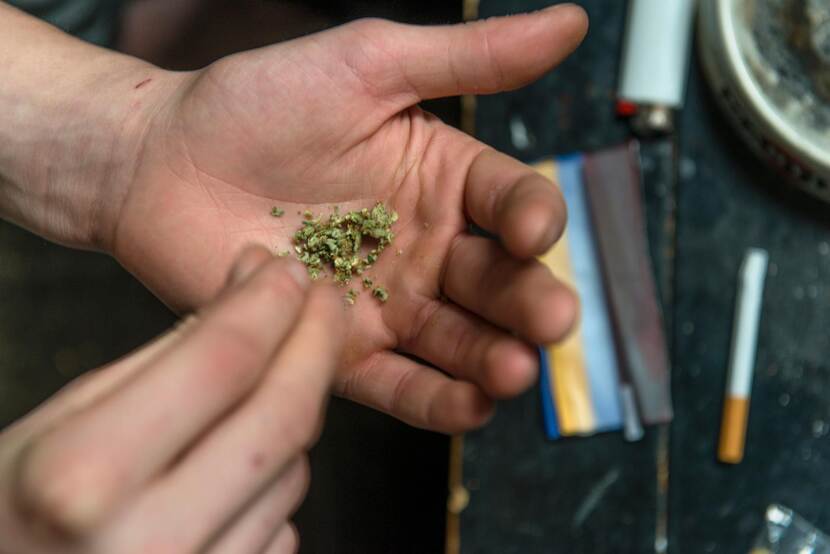The Dutch government is to press ahead with experiments in regulated marijuana production involving 10 licenced growers, according to detailed plans published on Thursday.
Dutch News Reports
The long-awaited experiment with regulated growing is supposed to remove the grey area between the sale of marijuana in council-licenced coffee shops and the illegal cultivation and supply. The plans, which were put out to consultation last year, state that the 10 growers will all have to produce at least 10 different types of marijuana product and the thc content will have to be clearly marked on the packaging. In addition, ministers have confirmed a minimum of six and maximum of 10 local authority areas will take part in the trials, which will run for at least four years. This means it will be up to the next cabinet to decide if the Netherlands should press ahead with state-controlled marijuana.
The experiment is opposed by the two Christian coalition parties, but is a key issue for the Liberal democratic party D66. Criticism The plans to date have been criticized by the Dutch local authorities association VNG, drugs and legal experts and coffee shop owners. The VNG says it will be hard to find local authorities willing to take part in the trials, which involve a commitment to stopping the sale of all non-regulated marijuana and cannabis within their borders. ‘
Coffee shops in the municipalities which are taking part in the experiment can only sell legally-produced hemp products and growers can only sell to those coffee shops,’ the government document states.
‘This means the entire chain will be closed.’
Both Rotterdam and Amsterdam have said this is a major objection.
In particular Amsterdam, with over 100 licenced coffee shops, said this would be impossible to achieve.
Phases Ministers have agreed to phase in the introduction of state-produced marijuana to coffee shops over a longer period, following comments made during the consultation process.
But once the trial is over, coffee shops will still have to revert to the illegal sector to find their supplies. If towns close to the German and Belgian borders take part, the coffee shops will still be banned from selling to people who do not live in the Netherlands, the document states.
‘In other areas, the mayor will be able to introduce such restrictions to prevent nuisance and drugs tourism.’ End of the year Ministers say they expect the decision about which local authorities will take part will be made by the end of the year. Last summer, the government’s highest advisory body, the Council of State, also criticised the plans, saying the experiment should be bigger than the government has determined. The experiment as now planned – with just six to 10 councils taking part over a four year period – will not be big enough to allow useful conclusions to be drawn, the council said.
Dutch Govt Announcement
Besluit inrichting gesloten coffeeshopketen naar parlement
Het ontwerpbesluit voor de inrichting van het ‘Experiment gesloten coffeeshopketen’ is vandaag door minister Bruins voor Medische Zorg en Sport en minister Grapperhaus van Justitie en Veiligheid naar de Eerste en Tweede Kamer gestuurd. Hierin staan de regels waaraan deelnemende partijen, zoals coffeeshophouders, telers en gemeenten, moeten voldoen. Het kabinet wil met het experiment onderzoeken of en hoe op kwaliteit gecontroleerde hennep of hasjiesj gedecriminaliseerd aan coffeeshops kan worden geleverd. Daarbij worden de effecten op criminaliteit, veiligheid, overlast en de volksgezondheid bekeken. Nu is de teelt en levering van cannabis aan coffeeshops verboden en wordt de verkoop, onder voorwaarden, gedoogd.
Beeld: Ministerie van Justitie en Veiligheid
Zoals aangekondigd in het regeerakkoord wordt het experiment met cannabisteelt voor recreatief gebruik in de gesloten coffeeshopketen uitgevoerd in maximaal tien gemeenten. De experimenteerfase duurt in principe vier jaar en wordt voorafgegaan door een voorbereidingsfase, waaronder een overgangsfase. Tot een overgangsfase is besloten na consultatie, omdat een plotselinge overgang van de gedoogsituatie naar de experimenteerfase niet wenselijk blijkt. Het is niet realistisch voor coffeeshops om het assortiment in één nacht te vervangen.
Coffeeshops en telers
Om te kunnen controleren op de geslotenheid van de keten en de meetbaarheid, moeten alle coffeeshops in de deelnemende gemeenten meedoen aan het experiment. Ook moeten die coffeeshops en de aangewezen telers een sluitende en transparante administratie bijhouden. Marktwerking bepaalt straks het aanbod en de prijs. Op de verpakking moet duidelijk het gehalte werkzame stoffen (THC en CBD) worden vermeld.
De coffeeshops verkopen de voorverpakte producten zoals geleverd door de teler. Om een breed gevarieerd aanbod te waarborgen, moeten telers bij de start van het experiment in staat zijn ten minste tien soorten te kunnen telen. De hennep wordt geproduceerd door ten hoogste tien telers. Daarnaast wordt de teler verantwoordelijk voor de verdere verwerking, verpakking en het vervoer van hennep en hasjiesj. De coffeeshophouders zijn verantwoordelijk voor heldere voorlichting aan klanten over de producten en preventie bij (problematisch) gebruik.
Coffeeshops en gemeenten
Voor coffeeshops in het experiment geldt niet de huidige grens in het gedoogbeleid van 500 gram cannabis als handelsvoorraad. Het uitgangspunt is dat er een maximum op basis van de weekvoorraad geldt. Voor coffeeshops in eventuele deelnemende grensgemeenten (landsgrens met België en Duitsland) zal het zogenoemde ingezetenencriterium gelden en is de verkoop van cannabis verboden aan personen die niet in Nederland wonen. In andere gemeenten kan de burgemeester op basis van de lokale situatie het ingezetenencriterium toepassen om overlast door drugstoerisme te voorkomen.
Deelname gemeenten
Nu het besluit ‘Experiment gesloten coffeeshopketen’ naar de Eerste en de Tweede Kamer is gestuurd, begint de parlementaire behandeling. Ook kunnen burgemeesters vanaf 23 april 2019 aangeven of ze interesse hebben om mee te doen aan het experiment. De verwachting is dat later dit jaar een besluit wordt genomen over welke gemeenten deelnemen.


















